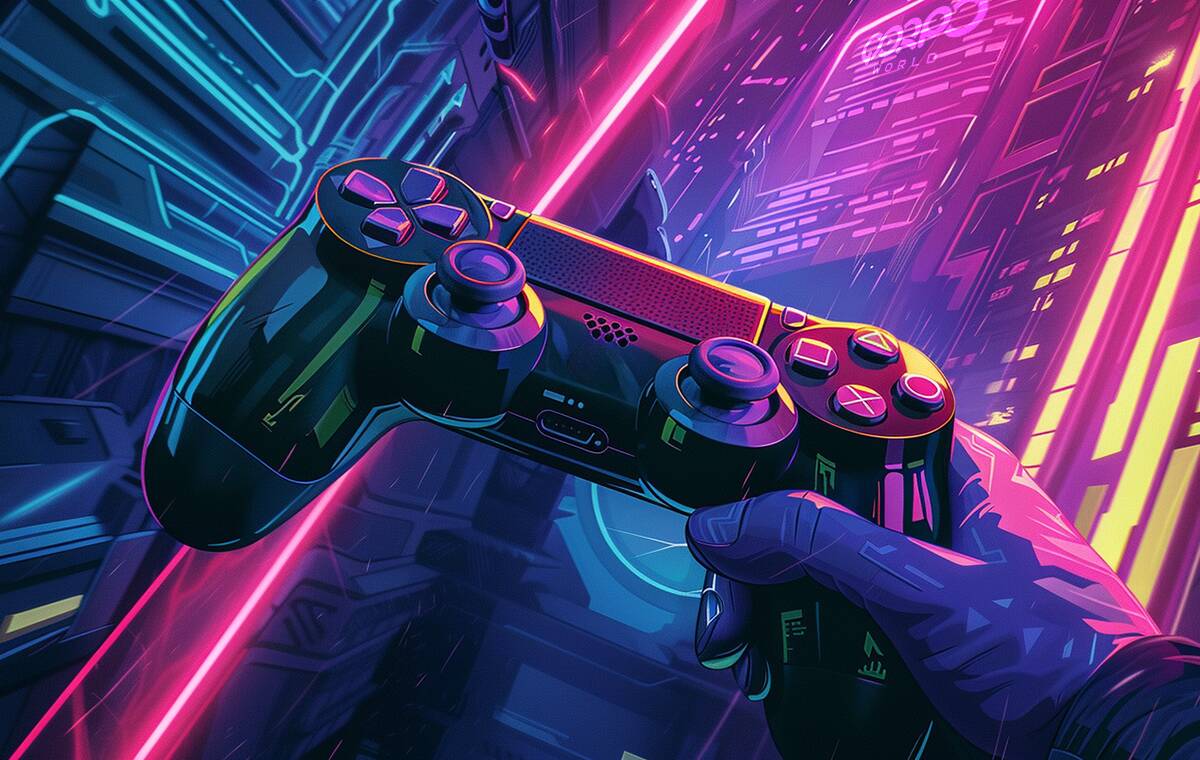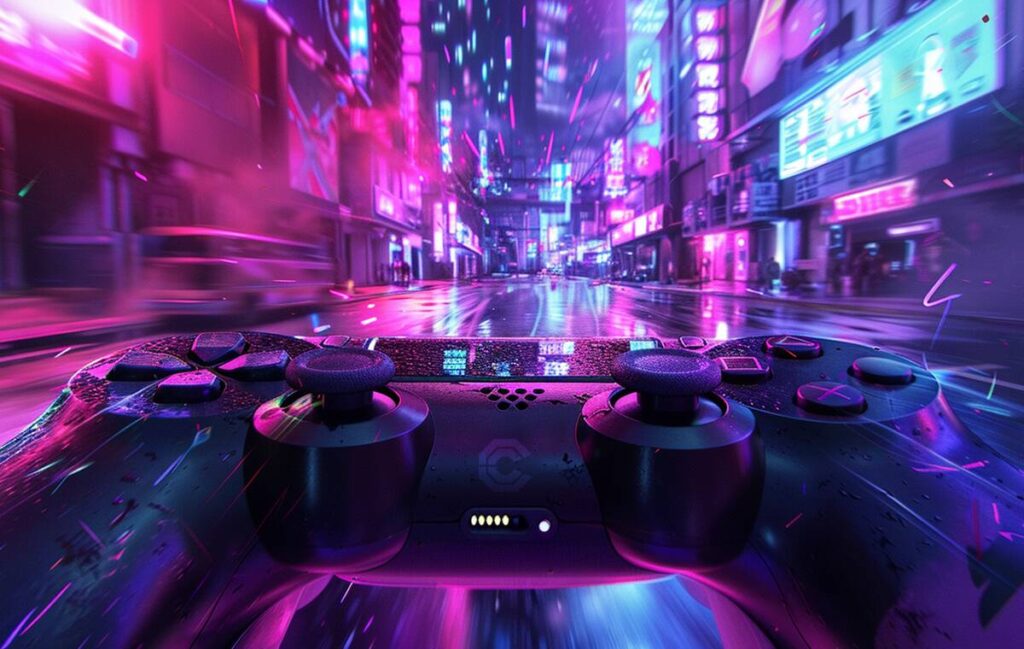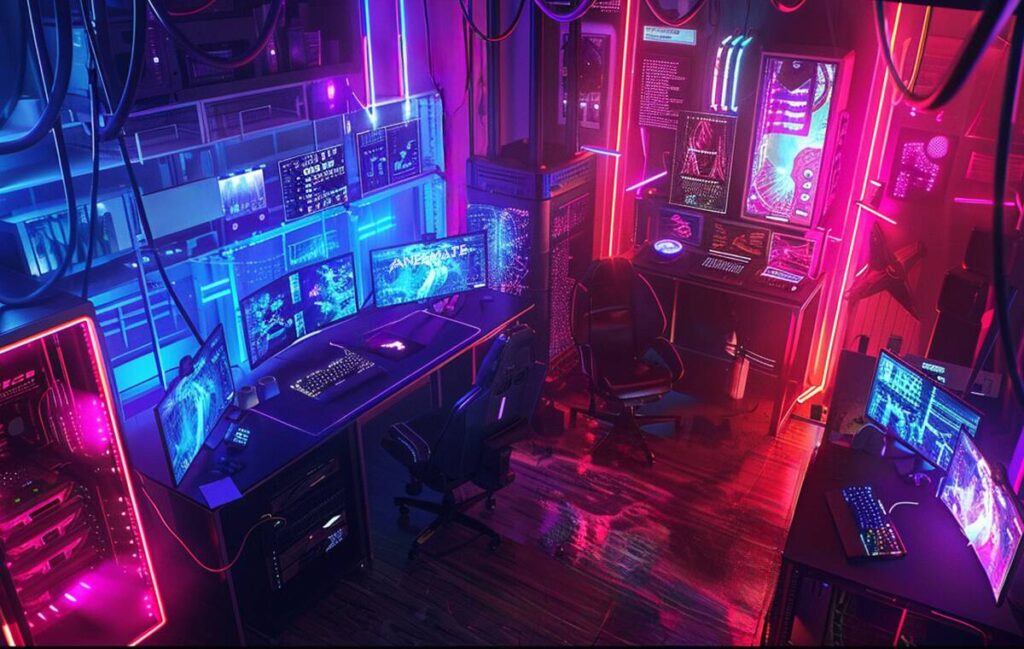
An Impact of AI on Game Industry & Web3 Gaming
AI in (not only) web3 gaming is becoming a social media-infesting buzz-word, moreover now, that we’re standing ahead of the bull-run narrative led by gaming and artificial intelligence. However, there’s more to AI integrations in gaming than meets the eye. Right now, we are standing on the crossroads for the game industry, and the upcoming events will reshape gaming for players and developers immensely. Let’s dive into the plethora of opportunities and challenges AI bestows upon the entire industry that is expected to reach $583.69 billion worth by 2030.
Impact of AI on Game Developers
Artificial Intelligence (AI) is changing the game development world. It gives developers new ways to be creative and make games better. AI affects many parts of game making, including making games more personal, improving how game worlds work, and making development faster. Especially in Web3 games, the need for increase in the gameplay quality and smoother user experience is a strong call, demanded by potential Web3 suitors. It’s all about better games in the blockchain space, as observed by QORPO World CEO, Rastislav Bakala in his Crypto Oasis report.

Unlocking Creativity & Dynamic Storytelling
One of the most significant impacts of AI in game development is the boost it gives to creativity and innovation. By taking over routine tasks, AI frees developers to concentrate on the more creative aspects of game design. This shift not only pushes the boundaries of game narratives, environments, and mechanics but also opens up new possibilities for storytelling and game interactions that were previously unattainable. The result is a more vibrant and diverse gaming landscape, where developers can explore new ideas and concepts without being bogged down by the minutiae of game development.
Furthermore, AI contributes to the creation of dynamic and immersive game worlds. Through procedural generation, AI can create vast, explorable environments that are unique to each player, while also simulating realistic ecosystems and NPC behaviors. This not only makes game worlds feel more alive but also adds a layer of depth and realism that enhances the overall gaming experience.
Personalized Player Experience
AI also plays a crucial role in personalizing the player experience. Through the analysis of player behavior and preferences, AI enables the creation of games that adapt in real-time, offering challenges, narratives, and interactions that are tailored to individual players. This level of personalization enhances player engagement and satisfaction, as games become more attuned to the needs and preferences of their audience.
Streamlined Development Processes
In terms of development processes, AI technologies streamline everything from design to testing. AI-driven tools assist in generating game assets, writing code, and testing game scenarios, which can significantly reduce development time and costs. This efficiency not only improves the quality of games but also allows developers to bring their visions to life more quickly and with fewer resources.
AI’s ability to analyze gameplay data is invaluable for game balancing. By identifying issues and adjusting difficulty levels and game mechanics, AI helps developers cater to a wide range of players, ensuring that games are challenging yet accessible to all skill levels.
According to the GITNUX Marketdata Report (2024), 36% of developers are already using some form of AI in mobile gaming, while AI can reduce operational expenses by 30-50%. This astounding impact is highlighted by the fact that in 2020, the global Mobile Gaming market size was valued at $76.7 billion and with the integration of AI, this is expected to reach $106.4 billion by 2027.
Another report by Unity Gaming shows that 62% of studios have embraced AI to enhance their workflows, especially in content creation and animation. Of these, 71% have reported that incorporating AI has significantly improved their delivery and operational efficiency.
How will AI evolve gameplay for players
Game developers are not the only ones taken by rapid evolution in AI and machine learning. Players are indeed at the forefront of the change that will inevitably disrupt the gaming industry. AI is here to stay, offering players unprecedented levels of immersion, personalization, and convenience. This innovation can play a key role in redeeming the sluggish player experience of many subpar Web3 games.
Two of the most significant advancements in this domain are the development of smart Non-Player Characters (NPCs) and AI Agents. These technologies are not just enhancing the gaming experience; they are redefining it. Here’s a look at the advantages these innovations offer to players.

Advantages of AI-Powered NPCs
- Personalized Gaming Experiences: AI-powered NPCs can understand and remember player actions, leading to a gaming experience that is unique to each player. This personal touch makes the game more engaging and can significantly increase replay value.
- Dynamic Conversations: Gone are the days of pre-scripted dialogues that feel wooden and predictable. With natural language processing, NPCs can now engage in fluid and realistic conversations, reacting to the player’s choices and even the tone of interactions. This makes the game world feel more alive and responsive.
- Emotional Intelligence: The next frontier for NPCs is emotional intelligence. Imagine playing a game where characters can sense and react to your emotional state, whether it’s through the tone of your voice or the actions you choose. This could lead to a deeper emotional connection with the game, making experiences more memorable and impactful.
- Collaborative Storytelling: AI enables a form of storytelling where the narrative evolves based on the choices of all players involved. This means that each playthrough can offer a new story, shaped by the collective decisions of the gaming community, adding a layer of depth and unpredictability to the narrative.
Advantages of AI Agents
- Learning and Adapting to Play-Styles: AI Agents use deep machine learning to understand individual play-styles. This means they can mimic a player’s gameplay, ensuring that the game progresses in a way that feels natural and personalized to each player.
- Gameplay Automation: Perhaps one of the most enticing features of AI Agents is their ability to take over gameplay during times when the player is busy or away. This ensures that progress is made, and results are optimized according to the player’s unique style, even in their absence.
- Optimized Results: By understanding and mimicking the player’s gameplay, AI Agents can optimize outcomes, making strategic decisions that align with the player’s preferences and strategies. This can be particularly beneficial in competitive gaming, where strategy and efficiency are key.
- Accessibility and Inclusion: AI Agents can make games more accessible to a wider audience, including those who may not have the time to invest in learning complex game mechanics or those with disabilities that make traditional gameplay challenging.
Simplified Player Onboarding with AI
Web3 gaming struggles with tedious onboarding experience. No longer. AI can be a game changer for player onboarding and retention. First, AI NPCs can personalize the onboarding experience. Unlike static tutorials, AI NPCs can adapt to the player’s skill level. This ensures new players get the help they need to avoid frustration, while experienced players can skip repetitive tutorials. Second, AI NPCs can make onboarding more engaging. The Inworld Research conducted on more than 1000 games shows players enjoy interacting with NPCs, and AI allows for a more natural and interactive experience compared to text-based tutorials. This increased enjoyment can lead to players spending more time in the game, which is a key factor in retention.
- Personalized Learning: Unlike one-size-fits-all tutorials, AI-powered NPCs can adapt the onboarding experience to the individual player. Imagine an AI mentor who gauges a player’s skill through gameplay and tailors the onboarding process accordingly. New players struggling with mechanics would receive targeted guidance, while veterans could bypass repetitive tutorials and delve deeper into the game. This data point is supported by the statistic that 99% of gamers felt AI NPCs would enhance gameplay, suggesting a strong preference for this personalized approach.
- Engagement and Agency: Static tutorials can feel dry and disengaging. AI NPCs, on the other hand, can create a more interactive and natural onboarding experience. The research you conducted showing 78% of gamers felt they’d spend more time playing with AI NPCs highlights this. By allowing players to learn through engaging interactions with AI characters, the onboarding process becomes more enjoyable, fostering a sense of agency that research suggests translates to increased playtime. This is further emphasized by the finding that an indie studio saw a 5% playtime increase after introducing AI NPCs.

Wrap-up and key takeaways
In conclusion, AI is revolutionizing the gaming industry, for both developers and players. AI offers a new level of creativity, personalization, and accessibility in games. From streamlining development processes to creating dynamic worlds and NPCs, AI is poised to shape the future of gaming. Here are the key takeaways:
For Developers:
- Boosts creativity by automating tasks.
- Personalized experiences through player behavior analysis.
- Creates dynamic game worlds.
- Streamlines development processes.
- Enhances game balancing through data analysis.
For Players:
- Personalized experiences with AI-powered NPCs.
- Dynamic conversations with NPCs using natural language processing.
- Emotional intelligence in NPCs for deeper connection.
- Collaborative storytelling for a unique narrative each time.
- AI Agents that learn and adapt to playing styles.
- Gameplay automation for busy players.
- Optimized results based on player preferences.
- Increased accessibility for a wider audience.

